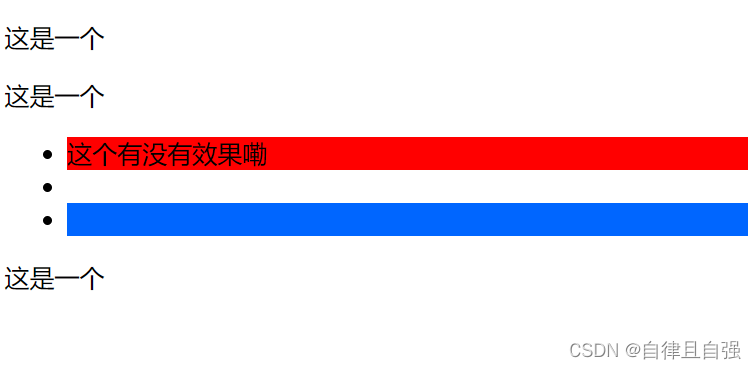CSS3作用
美化网页。字体,颜色,边距,宽度,高度,背景,网页定位,网页浮动,部分动画特效…
CSS3语法
1.在HTML文件里面直接写出css代码(内部样式表)
<head>
<meta charset="UTF-8">
<title>测试</title>
<style>
h1{
color: aqua;
}
</style>
</head>
2.新建一个css文件(推荐)(外部样式表)


- 结构(内容)和表现(美化)分离
- css文件可以多次复用
- 利用SEO,容易被搜索引擎收录
3.行内样式
(不推荐)
<h1 style="color: #2c4557">这是一个标题</h1>
三种语法优先级:就近原则。 谁离标签近就表现谁的。
选择器
1.三种基本选择器(重点)
1.1 标签选择器:对HTML里面所有的标签都有效(没有另外两种选择器),不能复用,不够灵活,不推荐。
1.2 类选择器:不同的标签都可以复用同一个class
语法是 .class的名称{…}
<style>
.test{
color: #1f389c;
}
</style>
...
<h1 class="test" >这是一个标题</h1>
1.3 id选择器:全局只能用一次
语法:#id的名称{…}
<style>
#bianqian{
color: #1f389c;
}
</style>
...
<h1 id="bianqian">这是一个标题</h1>
优先级:id选择器 > 类选择器 > 标签选择器
ps:写代码可以从浏览器里面调试(源代码)成想要的效果在把代码复制下来。
2.层次选择器
2.1后代选择器:在某个元素的后面,不管多少层都能被选择。(空格)

2.2 子选择器(>)

2.3 相邻兄弟选择器(+)向下选择

2.4 通用选择器(~)

优点:使用一个类选择器或id选择器就可以使一块区域的标签同时被选择。
3.伪类选择器
<style>
ul li:first-child{
background-color: red;
}
ul li:last-child{
background-color: #0066FF;
}
<!--识别伪类选择器看有没有冒号-->
</style>
<ul>
<li>这个有没有效果嘞</li>
<li></li>
<li></li>
</ul>

4.属性选择器
将类和id选择器结合起来
<style>
a[href^=http]{
background-color: #0066FF;
}
a[href$=jpg]{
background-color: #F8981D;
}
a[class*=mark]{
text-decoration: none;
}
</style>
<a href="https://www.bilibili.com" class="link mark" id="test">1</a>
<a href="image/123.png" class=" mark" id="test" >2</a>
<a href="image/23.jpg" id="test" >3</a>
运行结果:

语法:标签[属性名=属性值(可以是正则值)]{…}
正则表达式:
^=xx 开头为xx的值
$=xx 结尾为xx的值
*=xx 包含xx的值
=xx 绝对等于xx的值
美化网页元素(排版)
1.字体样式:font(具体:font-)
2.文本样式:
3.a标签伪类(hover为主)

4.列表

5.背景图片


渐变图片:
background-color: #8EC5FC;
background-image: linear-gradient(62deg, #8EC5FC 0%, #E0C3FC 100%);

渐变图片资源:https://www.grabient.com/
6.获取边距可以在网页源码调出想要的效果再把数据复制下来

7.boder-radius圆角边框
浮动
1.display属性(行内元素) 每个网站都有导航栏,使用ul li,使他们成一行的方法:display:inline-block
每个网站都有导航栏,使用ul li,使他们成一行的方法:display:inline-block

2.float属性
可以使许多块元素变成一行,将块元素与底层分开,使其往指定方向移动。
3. 清除左右浮动(行)但是保留浮动起来的效果:块元素+浮动元素
float:left ;
clear: both;
4.父级边框塌陷问题解决方案:
①浮动元素后面增加空div加clear:both(简单,但是代码中尽量不用空div)
②设置父级元素的高度(简单,元素有了父级高度就会被限制)
③父级元素增加 overflow:auto
④父类后添加一个伪类(原理和①差不多)

6.对比
display:让元素排在一列,没有方向
float:让元素排在一列,有方向,但需要解决父级边框塌陷问题
定位
1.相对定位 position:relative
相对于原先位置进行对应的偏移,偏移后仍然在标准文档流,保留原先位置。
2.绝对定位 position:absolute
没有父级元素定位的前提下,相对于浏览器定位,若父级元素存在定位(如position:relative)则相对于父级元素定位,偏移后不保留原先位置。
方块练习:
<!DOCTYPE html>
<html lang="en">
<head>
<meta charset="UTF-8">
<title>方块练习</title>
<style>
#father{
height: 600px;
width: 600px;
border: 1px solid red;
padding: 10px;
}
a:hover{
background-color: #0066FF;
}
a{
height: 200px;
width: 200px;
display: block;
text-align: center;
line-height: 200px;
font-size: 20px;
color: white;
text-decoration: none;
background-color: #F8981D;
}
/*把a标签转化为块元素*/
#second,#forth{
position: relative;
top: -200px;
left: 400px;
}
#fifth{
position: relative;
top: -600px;
left: 200px;
}
</style>
</head>
<body>
<div id="father">
<a href="#" id="firth" >链接1</a>
<a href="#" id="second" >链接2</a>
<a href="#" id="third">链接3</a>
<a href="#" id="forth">链接4</a>
<a href="#" id="fifth" >链接5</a>
</div>
<!--id选择器命名不能重复-->
</body>
</html>
运行结果:



3.固定定位 position:fixed
无论网页怎么变它都固定在对应的位置。
4.z-index定位
可以设置浮动起来的图层在上还是在下
z-index:0~999 表示从最下面的图层到最顶端的图层。
综合练习:(做一个商品链接)
<!DOCTYPE html>
<html lang="en">
<head>
<meta charset="UTF-8">
<title>商品链接</title>
<style>
body,ul,li{
padding: 0;
margin: 0;
}
img{
width: 270px;
height: 270px;
}
#content{
margin: 10px;
padding: 10px;
width: 290px;
height: 400px;
border: 1px solid #f34252;
overflow: hidden;
}
ul li{
list-style: none;
}
ul{
position: relative;
}
.first2 a{
text-decoration: none;
color: #393636;
font-size: 17px;
line-height: 25px;
}
.first3 a{
text-decoration: none;
color: red;
font-size: 15px;
line-height: 10px;
}
.first{
border: none;
height: 1px;
background-color: #aaa2a2;
opacity: 0.5;
margin: 10px;
}
.first4,.first5{
height: 20px;
width:70px;
position: absolute;
}
.first4{
z-index: 0;
background-color: #bab0b0;
}
.first5 {
font-weight: bold;
color: #e33d3d;
font-size: 12px;
line-height: 20px;
text-align: center;
}
.first6 span{
color: red;
font-size: 13px;
}
.first6{
color: red;
font-size: 20px;
bottom: -33px;
position: relative;
}
.first7{
display: block;
width: 100px;
height: 30px;
color: white;
font-size: 15px;
line-height: 25px;
text-align: center;
text-decoration: none;
border-radius: 5px;
background-color: red;
float: right;
}
</style>
</head>
<body>
<div id="content">
<ul>
<li class="first1"><a href="https://www.jd.com" target="_blank"><img src="../img/特仑苏商品图.jpg" alt=""></a></li>
<li class="first2"><a href="https://www.jd.com" target="_blank">特仑苏低脂牛奶250ml*16</a></li>
<li class="first3"><a href="https://www.jd.com" target="_blank">抢第二件5折</a></li>
<li class="first"><hr></li>
<li class="first4"></li>
<li class="first5">火速下单</li>
<li class="first6"><span>¥</span>9.9</li>
<li ><a href="https://www.jd.com" class="first7" target="_blank">立即抢购</a></li>
</ul>
</div>
</body>
</html>
运行结果:

拓展:
1.< canvas> 元素可被用来通过 JavaScript(Canvas API 或 WebGL API)绘制图形及图形动画。是 HTML5 新增的元素,只是一个画布,本身并不具有绘图的能力,绘图必须使用JavaScript等脚本语言。
2.卡巴斯基监控网站,可以查看全球网络威胁。页面很炫酷,可以欣赏一下。
3.前端有很多东西都是可以直接从模板网站里面找源码的,加上自己的idea加以修改就可以很块做出一个页面。
学习视频网址:https://www.bilibili.com/video/BV1YJ411a7dy?p=24&share_source=copy_web
























 被折叠的 条评论
为什么被折叠?
被折叠的 条评论
为什么被折叠?








